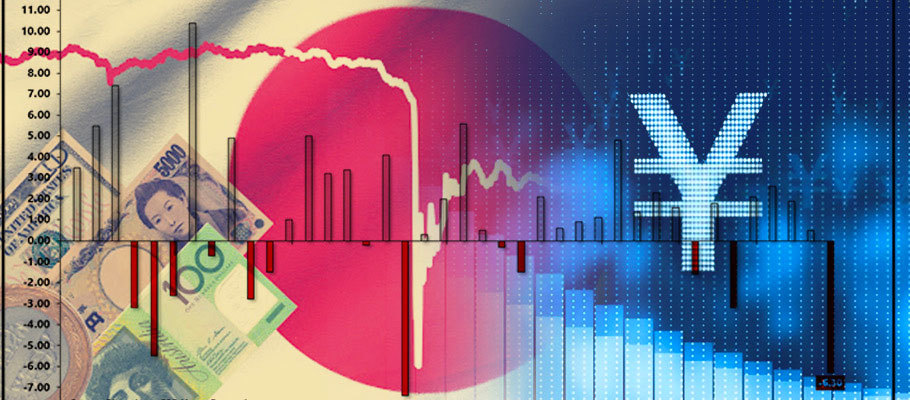
Published: February 21th, 2020
The Japanese economy contracted by the most substantial amount in more than five years, sparking concerns about a looming recession as the widening coronavirus outbreak impacts business activity.
Looking at the three months through December 2019, estimates by the Cabinet Office show Japan’s GDP dropped to an annualised pace of 6.3 per cent from the previous quarter.
Economists had predicted a fall of around 3.8 per cent, highlighting the negative impact of a recent increase to consumption tax, coupled with weakening global demand.
With coronavirus still on the march, the result raises the possibility that Prime Minister Shinzo Abe may have to try another round of additional spending to jump-start growth – just two months after implementing another unplanned stimulus package.
The surprise negative outcome also suggests that some of the government’s confidence in measures to soften the impact of its tax hike was over-egged.
Economists at Daiwa Securities are advising clients to prepare for another contraction in Japan’s Q1, pointing to an absence of factors to build a positive growth forecast on.
The investment firm is taking the view that the economy will likely dip into recession and expects the government to create another supplementary budget once evidence shows the economy has remained moribund in the first quarter.
The Bank of Japan had expected a smaller impact from the tax hike, especially when contrasted with a previous consumption tax rise in 2014 that hobbled the economy by more than 7 per cent. Foods were exempted this time, the tax increase was smaller, and the government has built-in policy countermeasures designed to minimise fluctuations in demand.
But economists have said mitigating steps like rebates on spending via cashless transactions, had minimal impact and didn’t consider that large segment of older consumers where adoption of mobile phone payment platforms is still weak.
Economists at Credit Suisse have noted the GDP numbers show vulnerability in Japan’s domestic consumption. Private purchases plunged by an annualised 11 per cent in the last quarter, as households stopped buying cars, white goods, and cosmetics.
Businesses also cut back on investment by 14 per cent. While the initial trade deal between the U.S. and China was expected to boost confidence for investment this quarter, the ongoing coronavirus outbreak has made Japan’s boardrooms cautious, and many are opting to wait for signs of a recovery from the tax shock before any further spending.
With concern over coronavirus intensifying across businesses and households, a growing mood of self-restraint may be hard to dislodge in the short term.
Hundreds of thousands of Chinese tourists planning to visit Japan at the start of the Olympic year have had to cancel their plans, turning off a vital source of revenue. China is Japan’s largest trading partner, so the longer the epidemic affects production and domestic demand across the East China Sea, the more likely it is that Japanese businesses will take a hit.
Government officials are already suggesting that budget taps could be opened up if further contraction looks certain.
‘We will pay close attention to the virus’s effect on tourism and the wider economy,” the economy ministry said in a statement. “Based on the level of response required, we will take steps as needed and respond robustly.’
PM Abe offered initial measures to counter the virus outbreak in mid-February. Still, given the proximity to December’s earlier stimulus, it’s expected that the government will wait for firm evidence of a recession before considering yet another injection into the economy.
The Bank of Japan also seems to want more data and time to assess underlying trends before using the 'R-word'.
Japan’s economy has also been grappling with the aftermath of Typhoon Hagibis, a powerful storm that hit the country last October. At the time, PM Abe warned that the storm’s impact on the economy could be prolonged, which has turned out to be prophetic.
The storm left 95 people dead, injured hundreds of others, and more than 230,000 people had to be evacuated ahead of the storm, with emergency orders issued for cities around the country.
Evacuation advisories were issued across the Tokyo metro region, affecting millions of people and shutting down transport systems.
There were widespread transport disruptions, with flights, bullet trains and other transport cancelled across the main island of Honshu.
With more than 93,250 structures damaged or destroyed, total economic losses from the storm have been estimated at more than USD 10 billion.
Abe said the government would draw on a USD 4.6 billion reserve fund to pay for costs related to storm relief.
A rising number of natural disasters with worsening impacts has prompted some economists to ask if Japan is becoming ‘disaster-prone,' as the effects of global warming make themselves felt on the country and region.
Widespread damage to farmland, rice and apple crops, irrigation canals, and roads exceeded 130 billion yen. Added to the previous devastation caused by Typhoon number 15, which landed on the island in early September 2019, damage exceeded 180 billion yen.
The typhoon has also impacted hot spring inns and hotels, with damaged pipes cutting off access to spring water. Some mountain rail services in central Japan were suspended after landslides washed sections away.
Businesses suffering storm damage are also reeling from an impending 4 per cent hike on disaster insurance premiums. The payouts following 2019's two significant typhoons exceeded 2 trillion yen, reducing the emergency reserves of major insurers.